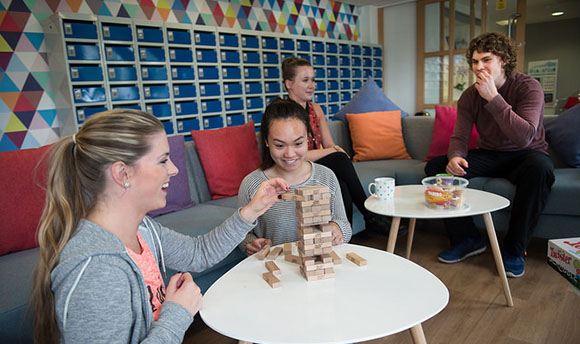From shark dives to high rise plank walks, Queen Margaret University’s first use of VR technology in the psychology lab opens up the doors to incredible new worlds, and with it, exciting new research prospects!
“This is the first research of this kind and has a high potential for impact in both for the psychological sciences and developmental health sciences.”
Dr. Kristen Knowles – ACEs and Virtual Sharks
Offering realistic experiences within controlled lab conditions, virtual reality research shatters the notion that lab experiments don’t reflect the real world.
As you can imagine, this is fertile new ground for stress research, allowing researchers to create realistic, stressful scenarios within the safety of the lab.
Dr. Knowles and myself have dived headfirst into this exciting new world, using virtual reality to explore the impact of adverse childhood experiences (ACEs) on the stress response of adults.
What are ACEs?
Since the original ACE study, the numerous negative impact of ACEs on life outcomes has been well documented, with 5 out of 10 of the leading causes of death being associated with ACEs.
From depression to cancer, these ACE health outcomes are linked by one thing: toxic stress. High levels of stress over time interrupt body functions important to repair, restoration and health due to overactivation. Not limited to negative biological outcomes, ACEs impact behavioral and cognitive outcomes, increasing mortality rate through outcomes such as increased risk taking and drug use.
“ACEs have been found to have lifelong impacts on health and behaviour and they are relevant to all sectors and involve all of us in society.”
Our research
Whilst changes in the stress response system have been shown to be an important factor in the negative outcomes of ACEs, how exactly ACEs impact the stress response system in adulthood remains a topic of debate. We plan to explore these inconsistencies and create an evidence based narrative of how ACEs translate to negative outcomes via stress.
Do ACEs result in an increase or decrease in stress in later life?
It is unclear whether those with ACEs are sensitised or desensitised to stress in adulthood. Will individuals with high ACEs respond more fearfully to stressful events, or will overactivation of their stress response system result in them being unable to distinguish between stressful and non-stressful events?
Are the effects of ACEs linear or cumulative?
Does each individual ACE contribute equally to negative outcomes, or does a critical threshold for dramatic neurological change exists? If a cumulative effect is found, this could have profound implications for how we understand the differences between those who have experienced childhood adversity, and open up new opportunities for therapy and prevention.
My experience so far
The journey from undergraduate, to my current masters and moving into my postgraduate has been incredible.
Starting as a passion for developmental psychology and a love of all things nerdy in first year, Dr. Knowles has helped me develop as a researcher and shared my passion throughout the first steps of this important research.
In response to my use of virtual reality in my undergraduate project, QMU has begun looking to invest in VR technology for the psychology department! Dr. Knowles has also hired me as a lab assistant to collect data to further the results of my undergraduate research – both things I could only have dreamed of in first year!
Looking beyond the world of covid and into my postgraduate, I can’t wait to jump back into the research rabbit hole and continue this exciting area of research.







